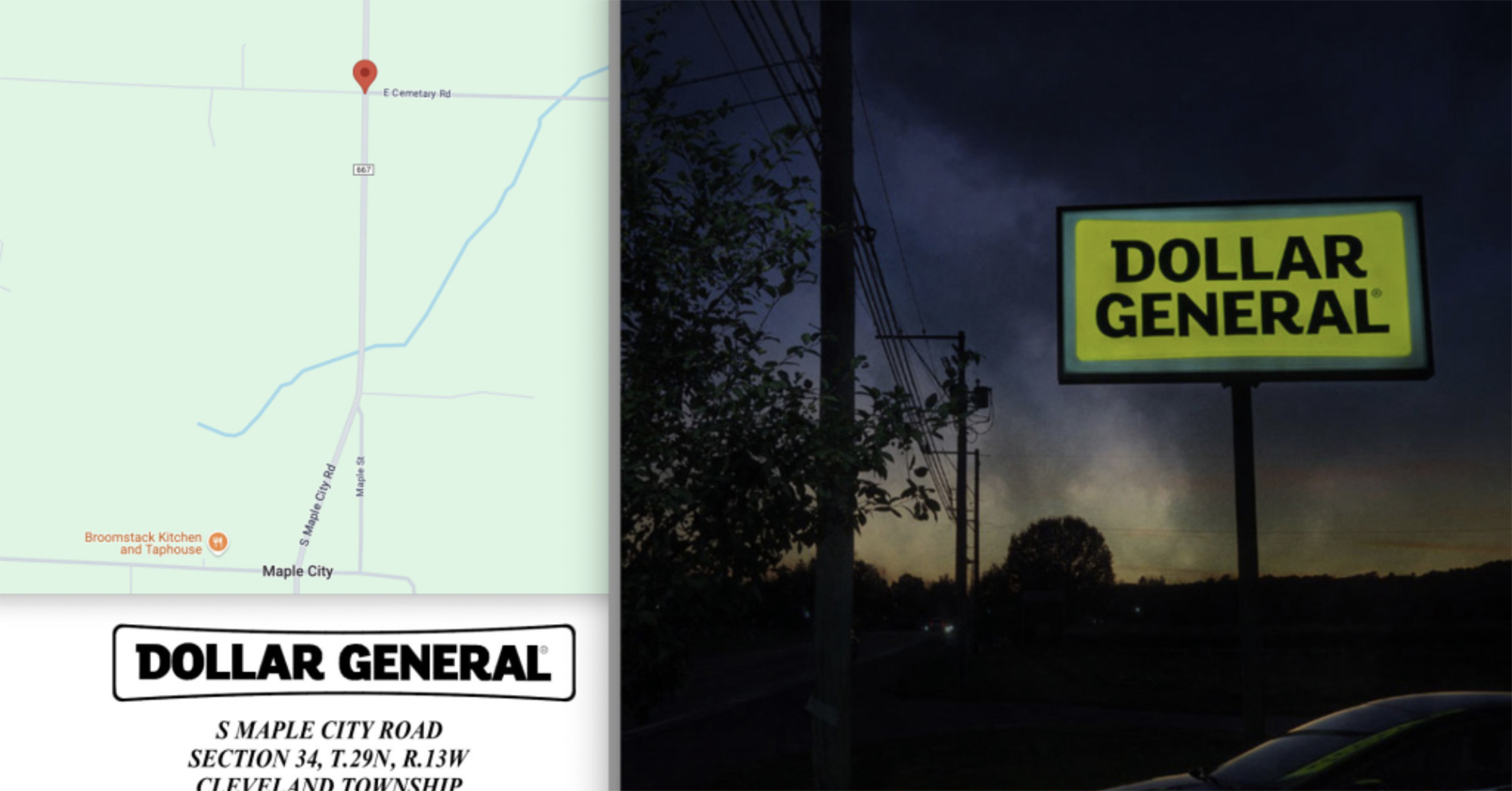Leelanau remains only county in Michigan without discount chain store
By Jacob Wheeler
Current Contributor
Twice Dollar General tried to build stores in 2019 in Leelanau County. Twice the discount chain goliath was defeated by local zoning and citizen opposition.
Midwest V, LLC, a west Michigan-based developer working on behalf of Dollar General, withdrew an offer in May of that year in downtown Maple City—in a location that later housed Habitat for Humanity’s six affordable units. In July 2019, a moratorium on zoning requests by the Empire Village Council showed Dollar General to the exits. Both towns recently lost their local grocery stores. Deering’s Market in Empire closed in 2018; Gabe’s in Maple City closed in 2019.
Residents opposed the dollar stores, which critics say undercut locally owned businesses and adversely affect the local character of communities.
A 2023 report by the Institute for Local Self-Reliance titled “The Dollar Store Invasion” states that “communities are in revolt, but the chains’ predatory tactics also call for federal action.”
The report continues:
“In 2021, nearly half of new stores that opened in the U.S. were chain dollar stores, a degree of momentum with no parallel in the history of the retail industry. At the start of 2022, Dollar General and Dollar Tree, which owns Family Dollar, together operated more than 34,000 stores in the U.S., more than McDonalds, Starbucks, Target, and Walmart combined.”
Midwest V, the same company that targeted Maple City and Empire six years ago, now wants to build a dollar store at the corner of Maple City Road and Cemetery Road in Cleveland Township—0.6 miles north of downtown Maple City. (The failed 2019 bid was in Kasson Township.)
According to Planning Commission chair Dean Manikas, the land in question is owned by the Marilyn Flaska Trust and is zoned “Business 2” on a parcel identified in the township’s Master Plan for business development; Flaska also owned the parcel in downtown Maple City that nearly became a dollar store in 2019.
Cautionary Tales from Neighbors
The Glen Arbor Sun reporting in 2019 on dollar stores in the region found that those discount chain stores squeezed locally owned rural grocery stores—and in some cases led to their demise.
Locally owned Honor Family Market was the subject of a story earlier this month in The New York Times. (A version of this story can be read in our online archives here.) The Schneider family’s business represents a success story.
However, dollar stores have impacted their bottom line.
The Schneider family opened Copemish Family Market on M-115 in 1980 and Honor Family Market on US-31 in 1992. Both grocery stores have become fixtures in their communities. But when a Family Dollar opened next to their store in Honor and a Dollar General opened a half-mile from their Copemish location, the volume of sales in each store took a hit.
“When they came in, it took us down to the break-even point—it hurt us considerably,” Patrick Schneider says. “We’re all about doing things local. A lot of people who support us are community-minded. Still, where we used to do a certain amount of business on a busy day, we don’t do that anymore.”
When Kaleva Meats owner Dave Barrett learned that a Dollar General was moving in three blocks away in early 2019, he closed shop that December—before the bloodletting would begin.
“I had Kaleva Meats for 11 years, but I got tired of putting money into it. The dollar store would have taken 25 percent of my business. I’m done fighting,” Barret said at the time. “If people start seeing what impact ]dollar stores] have, the tax breaks they get., “I recommend that a town get an ordinance in place to stop them. People that have ordinances against corporations like that seem to thrive.”
Maple City residents agreed with that sentiment and successfully fought off a dollar store in 2019.
“It doesn’t fit the landscape of our small, close-knit community,” says Mary MacDonald, who owns Pegtown Station, a popular restaurant a block away from the site targeted by Midwest V. “We need to band together and keep our eye on this, so we don’t let things slide through.”
Dollar Store Bid in Lake Ann
Dollar stores—which include Dollar General, Dollar Tree, and Family Dollar—are expanding in rural, and often economically depressed, towns throughout the United States.
In addition to the Dollar Tree in Honor, there are nearly a dozen discount dollar stores in and around Benzie County: a Dollar General in Copemish, Interlochen, Kaleva, Long Lake, Thompsonville, two in Bear Lake, one more in Springdale Township, as well as just outside Frankfort and along US-31 between Honor and Interlochen; there is also a Family Dollar in Benzonia.
“Small box” dollar stores—typically 9,100 square feet in size—specialize in selling cheap commodities and pre-packaged food that undercut locally owned grocery stores. Dollar stores work with developers and realtors who refuse to disclose their identity when courting land owners.
A dollar store suitor also tried to acquire land to open a location in Lake Ann in 2019.
That prompted Almira Township to institute a 60-day moratorium at a special meeting in April of that year on any commercial development, in order to give the Planning Commission the opportunity to review its zoning ordinance and potentially limit the size of commercial development in the municipality, which includes Lake Ann.
“We don’t want to discourage growth in the township, but we want it to be growth the township wants, as represented by our constituents,” Almira Township board member Matt Therrien, who also owns Lake Ann Brewing Company, said at the time. Therrien emphasized that local zoning is what decides what development is and is not allowed—not community activism.
Therrien was contacted in spring 2019 by a downstate realtor with a Lansing-area phone number who has a P.O. box in Frankfort and is a member of the Benzie County Chamber of Commerce. She inquired about a commercially zoned piece of land that he owns about a half-mile from downtown Lake Ann.
Therrien received a high offer for the land but was wary of selling to an anonymous corporation that refused to disclose its identity.
Therrien returned the realtor’s call and said, “If this is a Dollar General or Family Dollar, we’re not interested in selling.” Therrien recalled that a 10-second pause ensued, and the realtor said, “I’ll let the buyers know.” Two hours later, he received a text stating that “the buyers find these terms unusual and wish to withdraw their offer.”
The same realtor later inadvertently called Therrien’s cell phone number while pursuing other Lake Ann residents about their commercial properties.
“Without knowing who I’m selling to, I’d have to deem it a good fit for my town before I’d get on board,” Therrien said in 2019. “It would otherwise reflect poorly on me, and my beer might not taste as good as before—if you know what I’m saying.”
John Nuske, who owns Lake Ann Grocery, was also alarmed to hear of a dollar store’s interest in 2019.
“Yes, Dollar General would provide competition for my business,” he said at the time. “But all they do is add some convenience stuff at convenient hours. They might be able to beat me at the price of milk and eggs, but all they’ll have is cheap [stuff] made in China.”
All Comes Down to Zoning
In 2015, a bid to acquire land and open a dollar store on M-22 north of Empire failed when residents revolted—more than 70 residents signed a petition opposing the development—and the village council voted unanimously against changing zoning laws that would have allowed for the development.
Not to be deterred, Dollar General was able to land a foothold next to the gateway arch just outside of Frankfort in 2016, after securing approval from Crystal Lake Township. Dollar General had initially wanted to put a store on the east end of Main Street in Frankfort, but that proved too difficult when city officials made it clear that zoning laws would not be bent to accommodate the store’s cookie-cutter model—a formal proposal was never made to the City of Frankfort, because it never got that far.
“I communicated with a person who [Dollar General] had sent to look at sites, and we had a lengthy conversation about our zoning,” Joshua Mills, city manager for Frankfort, said in 2019. “For vacant lots in our commercial corridor, we require a minimum of 30-foot height, which promotes two-story structures—we do allow for three-story, also—so our zoning required two stories, unless they bought an existing structure. We encouraged them to build workforce housing in the second floor, or maybe condominiums that could be sold. Or they could have bought an existing structure: the [former Honor Frankfort Onekama] building supply store was for sale at the time. All of those concepts could have been adapted or reused for the purpose of a Dollar General. But that is when they found the site in Crystal Lake Township.”
In other words, when zoning got tough within the City of Frankfort, Dollar General found a site just outside of the city lines—in Crystal Lake Township—where the zoning laws were not as strict.
“There are some people who were upset. A lot of them regularly came to our meetings,” Amy Ferris, supervisor for Crystal Lake Township, told the Benzie County Record Patriot back in April 2016. But there was nothing in the township’s ordinances that would prevent such a development.
Nearly a decade ago, Benzie County went from a county-wide zoning model to one in which each township, village, and city would administer its own zoning and planning. While the city’s zoning would have required the construction of a two-story building, the rules in Crystal Lake Township—just a few hundred yards from the city line—were looser, and thus the developers found it more appealing.
Now, nine years after the construction of that Dollar General store, citizens of other small towns in our area are learning what to do when a national corporation comes knocking. The prospect of a small-box chain moving into these tiny communities often draws swift, near-unanimous opposition from local citizens.
And sure, letters to the editors of local papers, blasts on social media platforms, and showing up to/speaking out at a township meeting are all well and good; but the real results come from good, thorough zoning laws—and then holding elected officials responsible for upholding them.
Mess In Honor
In April 2024, development began for a new Dollar General store along US-31 in Homestead Township, just outside the Village of Honor—but work was quickly halted by Michigan’s Environment, Great Lakes, and Energy (EGLE) department.
“EGLE received multiple complaints April 4 about construction work being done in wetlands off Honor Highway at a site planned for a new Dollar General store,” Jake Riley, district supervisor for the Water Resources Division of EGLE’s Cadillac office, wrote in an email to the Benzie County Record Patriot. “Our staff quickly followed up with the contractor and property owner to inform them they did not have a permit to work in the regulated wetlands. We posted a violation placard advising that work not continue onsite.”
The application for the 12,480-square-foot Dollar General had been submitted by Westwind Construction, and the site plans had been approved and met all of the township zoning requirements, according to what Homestead Township’s zoning administrator, Marvin Radtke, told the Record Patriot. Additionally, the developer’s request to be connected to the Village of Honor’s sewer system had been accepted.
Radtke said that the county was responsible for soil erosion or construction code enforcement. Meanwhile, Homestead Township did not ask for any environmental studies, because the property use was by right, given the zoning; however, there was wetland delineation provided on the site plan.
“[The property] is zoned commercial, and retail stores are permitted by right, provided that they supply the prerequisite permits, like driveway permits and approvals for well and/or sewer,” Radtke told the Record Patriot. “They had access approval from the Michigan Department of Transportation [MDOT] and met our requirements for setbacks and parking spaces.”
The situation that excavators found when they began work on the site did not line up with what was in the site plan, though—the water table was higher than expected.
“They were there doing some preparation in the evening when I got a call,” he told the Record Patriot. “The excavator said there were some issues. Water was filling the excavation site. We don’t know if there were some soil borings not completed or not required. There were also some heavy rains at the time—all we know is things weren’t exactly the way they were on the site plans.”
At that point, EGLE was contacted.
“EGLE’s primary interest and goal is protection of public health and the natural environment,” EGLE’s Riley wrote to the Record Patriot. “Wetlands provide many important benefits and play a vital role in recreation, tourism, and the economy. Some of the benefits wetlands provide include flood and storm control; providing essential habitats for many forms of wildlife, waterfowl, and rare, threatened, or endangered species; providing nursery grounds and sanctuaries for fish; and pollution control by cleaning the water as they serve as sedimentation and filtration basins. Since wetlands play such a vital role in protecting Michigan’s water resources, it is important that permits are obtained from EGLE before any work in regulated wetlands begins.”
Ultimately, after an investigation, EGLE found that the developers did not have a permit to work in a regulated wetland. A violation notice was posted and work was halted.
The Betsie Current reached out to Riley for an update on where the case stands now, nine months later—it is still considered an active compliance case.
“We’re working toward an agreement with the developer to restore the wetlands back to their original condition,” Riley told the Current.
That means there will most likely not be a store at this location.
The Cleveland Township Planning Commission will hold a public hearing about the proposed development for Maple City on Wednesday, February 5, at 7 p.m. at the Township Hall. Midwest V’s application for site plan review, as well as its site development plan, can be viewed online.
A version of this article first published in the Glen Arbor Sun, a Leelanau County-based semi-sister publication to The Betsie Current.
—————
Featured Photo Caption: At a special meeting on Tuesday, February 4, the Cleveland Township Board unanimously passed a moratorium on any applications for zoning or building in the Business 1 and Business 2 zoning districts until August 4, 2025, with the option to extend for another six months. Image courtesy of the Glen Arbor Sun.
Editor’s Update: At a special meeting on Tuesday, February 4, the Cleveland Township Board unanimously passed a moratorium on any applications for zoning or building in the Business 1 and Business 2 zoning districts until August 4, 2025, with the option to extend for another six months. The Planning Commission meeting scheduled for Wednesday, February 5, was cancelled. That moratorium stops, for now, a proposed Dollar General development at the corner of Maple City Road and Cemetery Road in Cleveland Township—0.6 miles north of downtown Maple City, where the same company, Midwest V, sought to build a dollar store in 2019. The land in question is owned by the Marilyn Flaska Trust, as was the land in Maple City where Habitat for Humanity affordable homes were built instead. At the Board meeting on February 4, township supervisor Tim Stein said that feedback he had received indicated that local citizens spoke with a common voice in opposing a dollar store in their township. Leelanau remains the only county in Michigan without a discount chain store. Stay tuned for more as this story develops.





There’s a new DG going to go up near Homestead Rd. & US 31. My engineering company I used to be an owner of is doing the surveying and site plan review work right now.